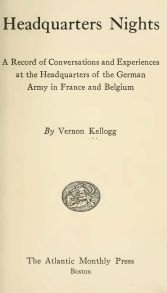
When I was writing not so long ago about the enigmatic figure of the Gentleman with a Duster—whose animadversions on Darwinism in the preface to the American edition of The Glass of Fashion (1921) were invoked by Arthur I. Brown and William Jennings Bryan—I quoted the Gentleman as complaining that Darwinism “justifies Prussianism at the cannon, and Bolshevism at the prison-door.” Robert Dekko asked about the alleged connection between militarism and evolution, and I answered, “There were actually contemporary reports blaming World War I in part on the acceptance (and misunderstanding) of evolution by German militarists, including from confirmed evolutionists—e.g., the Stanford entomologist Vernon Lyman Kellogg’s Headquarters Nights (1917). So it’s not just a creationist myth, although I think that a sober historical assessment wouldn’t regard acceptance of evolution as a significant cause of the war.”
According to Kellogg, when he was visiting the German headquarters in Belgium and France, he talked with a German biologist-turned-soldier who was eager to explain to him “why, for the good of the world, there should be this war, and why, for the good of the world, the Germans should win it, win it completely and terribly.” He described his informant as “neo-Darwinian,” stressing the primacy of natural selection in evolution. “The creed of the Allmacht [omnipotence] of a natural selection based on violent and fatal competitive struggle is the gospel of the German intellectuals; all else is illusion and anathema…this struggle not only must go on, for that is the natural law, but it should go on, so that this natural law may work out in its cruel, inevitable way the salvation of the human species. By its salvation is meant its desirable natural evolution.” As a result, Kellogg abandoned his pacifism and advocated American entry into the war.
Replying to my comment, the pseudonymous diogeneslamp0 expressed his or her view about Headquarters Nights: “a ridiculous book” which “bases its claims that Germany’s policy is based on Darwinism on the statements of an anonymous infantry captain, pseudonymously called ‘Von Flussen’. No direct quotes of ‘Von Flussen’ are given but Kellogg asserts that his Darwinism is typical of the German military and therefore caused the war.” After astutely noting that antievolution literature before the war praised German scientists who rejected evolution (or at least Darwinism) but after the war blamed the conflict on German acceptance of Darwinism (or even evolution), diogeneslamp0 set me a challenge: “Since you, Glenn, like solving historical mysteries, and outing anonymous speakers, have you ever thought of digging up the real identity of this ‘Von Flussen’ (if he existed)[?]” I accepted the challenge, of course.
Unfortunately, the text was not especially helpful. Neither in “Headquarters Nights,” published in The Atlantic Monthly in August 1917, nor in the book based on it, Headquarters Nights: A Record of Conversations and Experiences at the Headquarters of the German Army in France and Belgium (1917), is there more than the following description of von Flussen:
…an infantry captain, who lived in the house with my guardian officer and me, is the professor of zoölogy in one of the larger German universities, and one of the most brilliant of present-day biologists. I do not wish to indicate his person more particularly, for I shall say some hard things about him—or about him as representative of many—and we are friends. Indeed, he was Privat-docent [sic] in charge of the laboratory in which I worked years ago at the University of Leipzig, and we have been correspondents and friends ever since.… Professor von Flussen—that is not his name—is a biologist.
And yet, I’m pleased to say, it took only about ten minutes for me to identify von Flussen. My great advantage in doing so was that I remembered that Mark Largent, a historian of science at Michigan State University, wrote his dissertation on Kellogg at the University of Minnesota in 2000, and I figured that there might be a clue there.
It wasn’t just a clue I found. In his dissertation, Largent writes, “Kellogg’s entry into the mindset of German intellectuals and natural philosophers came through his friendship with Otto Zur Strassen, the Private-dozent [sic] in charge of Leuckart’s laboratory when Kellogg was a student there in the 1890s. Because of the ‘hard things’ Kellogg said about Zur Strassen in Headquarters Nights, he chose not to refer to him by his real name, instead calling him ‘Professor von Flussen’ and referring to him as ‘one of the most brilliant of present-day biologists.’” A footnote on the last sentence quotes a 1919 letter from Kellogg to David Starr Jordan, the biologist and by then former president of Stanford University, describing zur Strassen as “my Headquarters Nights hero!” There is of course a striking similarity between the names “von Flussen” and “zur Strassen,” especially if “Flussen” is corrected to “Flüssen” (i.e., rivers) to match “Strassen” (i.e., roads).
Who was Otto zur Strassen? According to a short biography at the University of Leipzig, he was born in Berlin in 1869. He received his doctorate in biology in 1892 and his habilitation in zoology in 1896 from the University of Leipzig, where he became a professor of zoology. He moved to Frankfurt am Main, where he served as the director of the Senckenberg Museum and also as professor of zoology at the university from 1914 to 1937. (His military service isn’t mentioned.) The author of a number of technical scientific publications, he also was the editor of the fourth edition of Brehms Tierleben (Brehm’s Life of Animals; 1911–1918), a famous zoological encyclopedia. He died in Oberursel in 1961. The question remains, of course, whether Kellogg’s characterization of his views is defensible, and if I ever summon the energy to read through a relevant 10,000-word essay in German of zur Strassen’s I found, I’ll let you know …

